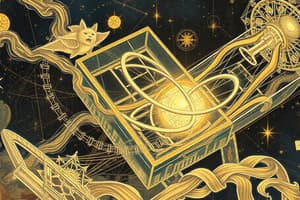Podcast
Questions and Answers
What is 'the net' and what mythical story inspired its creation?
What is 'the net' and what mythical story inspired its creation?
'The net' is a purple alloy created by Newton, inspired by the myth of Vulcan catching Venus and Mars.
How does Bill Newman’s work reflect on the nature of Newton's alchemy?
How does Bill Newman’s work reflect on the nature of Newton's alchemy?
Newman's work shows that Newton's alchemy was systematic, reproducible, and verifiable, much like modern science.
What role did alchemy play in the scientific understanding of the universe during Newton's time?
What role did alchemy play in the scientific understanding of the universe during Newton's time?
Alchemy was seen as a form of matter theory, addressing fundamental questions about the composition of the universe.
What controversial belief about Christianity did Newton hold, according to the content?
What controversial belief about Christianity did Newton hold, according to the content?
What was the significance of the manuscripts discovered in Jerusalem related to Newton?
What was the significance of the manuscripts discovered in Jerusalem related to Newton?
What theological belief did Newton come to deny, leading him to view the Trinity as a heresy?
What theological belief did Newton come to deny, leading him to view the Trinity as a heresy?
How would Newton's anti-Trinitarian beliefs have impacted his career if they had been exposed?
How would Newton's anti-Trinitarian beliefs have impacted his career if they had been exposed?
In what way did Newton relate his studies of science and religion?
In what way did Newton relate his studies of science and religion?
What significant question did Edmond Halley pose to Newton that refocused him on physics?
What significant question did Edmond Halley pose to Newton that refocused him on physics?
What mathematical law did Newton prove that explained the motion of planets around the sun?
What mathematical law did Newton prove that explained the motion of planets around the sun?
What was the significant impact of Newton's 'Principia Mathematica' on the understanding of motion?
What was the significant impact of Newton's 'Principia Mathematica' on the understanding of motion?
How did Galileo's view on celestial motion differ from Newton's?
How did Galileo's view on celestial motion differ from Newton's?
What are Newton's three laws of motion?
What are Newton's three laws of motion?
What thought experiment did Newton use to illustrate his ideas about gravity and motion?
What thought experiment did Newton use to illustrate his ideas about gravity and motion?
What is the universal law of gravitation, according to Newton?
What is the universal law of gravitation, according to Newton?
Study Notes
Newton's "Net" and Alchemy
- Newton's alchemical recipe called "the net" was inspired by a myth from Ovid's "Metamorphosis," where the god Vulcan catches his wife Venus and Mars in bed.
- The myth translates in alchemy to copper, iron, and fire, which Bill Newman used to create a purple alloy with a striated net-like surface.
- Newton's alchemy was a systematic process with verifiable results.
- Other notable scientists of the time, including members of the Royal Society, also practiced alchemy.
- Alchemy was considered a science investigating the fundamental components of matter and the universe.
Newton's Secret Religious Beliefs
- Newton believed the Trinity doctrine of Christianity was false, believing that Christ was the Son of God but not his equal.
- He held these beliefs in secret, as denying the Trinity was illegal in England.
- He wrote more about theology and alchemy than science and math combined.
Newton's Passion for Biblical Interpretation
- Newton examined Bibles extensively, correlating passages with astronomical information.
- He redated ancient history based on his interpretations, creating elaborate charts and chronologies dating civilization to 980 B.C.
- He also sought to discover the date of Christ's return, predicting 2060.
- Newton believed that science and religion were inseparable, both parts of his quest to understand the universe.
Newton's Breakthrough Discoveries
- Edmond Halley's question about planetary orbits triggered Newton's groundbreaking work on gravity.
- Newton proved mathematically that a planet obeying the inverse square law of gravity must travel in an elliptical orbit.
- He developed three laws of motion: objects in motion stay in motion unless acted upon by an external force, acceleration is proportional to exerted force, and for every action there is an equal and opposite reaction.
Newton's "Universal Law of Gravitation"
- Newton's thought experiment with a cannonball fired from a tall mountain demonstrated how gravity influences objects on Earth and in space.
- He realized that the moon's orbit and a cannonball's movement are both governed by the same law of gravity.
- He expanded this concept to include the entire solar system, proclaiming that the "universal law of gravitation" operates everywhere in the universe.
- This idea revolutionized how people perceive the universe and our place in it.
Newton's Unresolved Questions
- Newton's contemporaries questioned his lack of explanation for gravity, arguing it seemed like an occult philosophy.
- Newton's interest in alchemy, particularly "vegetation of metals," might have influenced his understanding of gravity.
- Newton's alchemical research didn't yield scientific breakthroughs like his work in physics and math.
Newton's Later Years
- Newton experienced what many believe was a nervous breakdown, possibly due to exhaustion.
- After his recovery, he transitioned into public life, accepting the position of Master of the Mint, becoming a Member of Parliament, president of the Royal Society, and receiving a knighthood.
- He published his second masterpiece, "Opticks," and finally included his calculus ideas 40 years after their conception.
- Despite giving up public alchemy, he continued to devote himself to theology, keeping his heretical beliefs secret until his death.
- Newton died in 1727, leaving behind a legacy of scientific achievements and controversial religious beliefs.
Studying That Suits You
Use AI to generate personalized quizzes and flashcards to suit your learning preferences.
Description
Explore the intricate relationship between Isaac Newton's alchemical practices and his secret religious beliefs. This quiz delves into Newton's inspirations from mythology, his systematic approach to alchemy, and his theological views, which he could not openly express in his time. Uncover the complexities of his work that intertwines science, alchemy, and spirituality.



